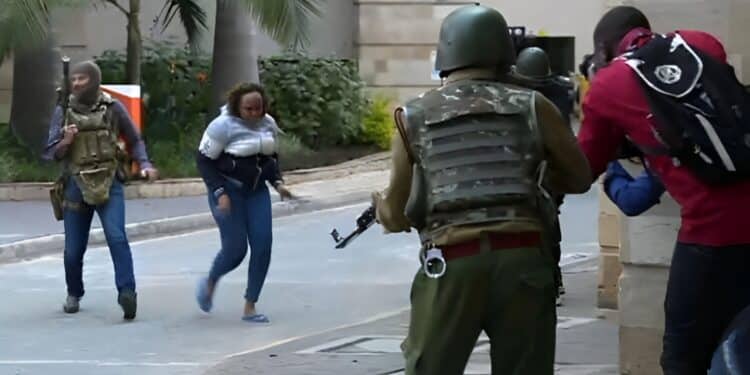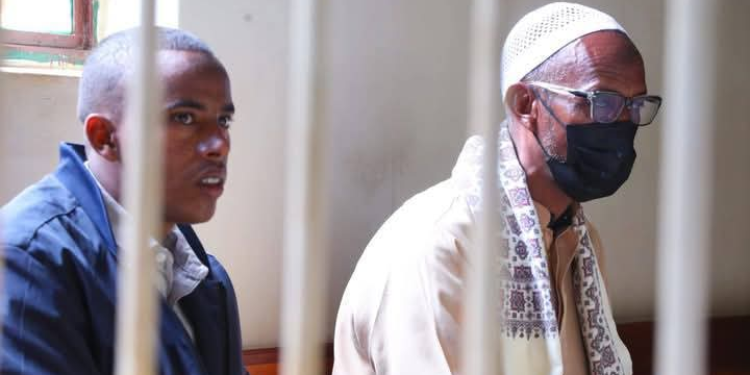Two men who were found guilty of financing and facilitating the 2019 terrorist attack at the Dusit D2 Hotel Complex in Nairobi have been sentenced to jail.
The duo, Mohamed Abdi Ali and Hussein Abdile Ali, had been found guilty of financing and facilitating the attack, which claimed the lives of 21 people, including foreign nationals, and left several others injured.
Lady Justice Diana Kavedza, in a ruling delivered at the Kahawa Anti-Terror Court, said the prosecution had proven its case beyond reasonable doubt against the two on all charges except count two, for which both were acquitted.
The judge on Wednesday, June 19, sentenced Mohamed Abdi Ali to 15 years for each of the 14 charges of facilitating a terrorist act contrary to Section 9A of the Prevention of Terrorism Act, which will run concurrently.
The 61-year-old madrassa teacher also received an additional sentence of 15 years for the charge of Conspiracy to commit an offence contrary to Section 23(2) as read with 23(4) of the Prevention of Terrorism Act 2012.
At the same time, the court sentenced Hussein Mohamed Abdille Ali to serve 15 years’ imprisonment after he was convicted of an offence of Conspiracy to commit an offence.
Dusit D2 terror attack suspects Sentenced
The 22-year-old also received another 15 years for Facilitation of a Terrorist Act under the Prevention of Terrorism Act. The sentence will run consecutively.
Also Read: Man Sentenced to Death for Stealing Tecno Phone and Ksh30,000
Delivering the sentence on Thursday, Lady Justice Kavedza ruled that the court was satisfied that the prosecution had proved its case against the two beyond reasonable doubt.
The Director of Public Prosecutions (DPP) submitted to court that the Dusit D2 complex attack resulted in the tragic loss of 21 vibrant and enterprising professionals, and the survivors have continued to grapple with the lasting effects of the attack, living with trauma that haunted their daily lives.
The DPP highlighted in court a victim impact statement report that was filed by the Probation and Aftercare Service officer stating that one of the survivors has bullets lodged in his body, leading to ongoing medical complications and substantial medical bills that strain his financial resources.
In addition, American national Joseph Spindler narrated to the court how his son’s life was cut short in the terrorist attack.
Also Read: Supreme Court Delivers Verdict on Substituting Life Sentence with 30-Year-Term
Submissions
In his victim impact statement report to court ahead of sentencing, Spindler recalled how his firstborn child, Jason Spindler, died at 40 years old in a country he enjoyed working in, and losing him was a wound that never heals.
“Your Honor, I’m not here for revenge but for justice. Under Kenyan law, those who collaborated with terrorists must face the full weight of justice. Jason was a survivor, a doer, and a visionary. He deserved a future, not a grave marked by the shrapnel from a terrorist’s suicide vest,” said Spindler in his statement.
The court also heard that prior to the attack, the employees at the Dusit D2 complex enjoyed enhanced income through salaries, bonuses, and incentives linked to the charges of the tenants who fully occupied the complex, with occupancy rates plummeting to 100% with human traffic approximately 2,500 daily.
After the terror attack, the occupancy rates declined to 55%, and human traffic reduced to about 200 people daily.
The DPP urged the court to grant maximum sentences to the convicts and that the sentences should run consecutively to enable them to reflect on the severity of their actions.
He also advocated for a stringent, deterrent sentence to be imposed, serving as a strong message against future acts of terrorism and affirming the justice system’ commitment to holding perpetrators accountable for their crimes.
Follow our WhatsApp Channel and X Account for real-time news updates.













































































